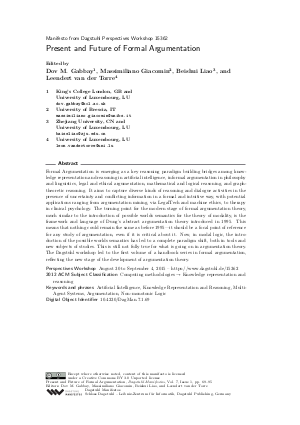Present and Future of Formal Argumentation (Dagstuhl Perspectives Workshop 15362)
Authors Dov M. Gabbay, Massimiliano Giacomin, Beishui Liao, Leendert van der Torre
-
Part of:
Issue:
Dagstuhl Manifestos, Volume 7, Issue 1
Part of: Volume: Dagstuhl Manifestos, Volume 7
Part of: Journal: Dagstuhl Manifestos (DagMan) - License:
 Creative Commons Attribution 3.0 Unported license
Creative Commons Attribution 3.0 Unported license
- Publication Date: 2018-11-16
File

PDF
DagMan.7.1.69.pdf
- Filesize: 0.8 MB
- 27 pages
Document Identifiers
Subject Classification
Keywords
- Artificial Intelligence
- Knowledge Representation and Reasoning
- Multi-Agent Systems
- Argumentation
- Non-monotonic Logic
Metrics
- Access Statistics
-
Total Accesses (updated on a weekly basis)
0PDF Downloads0Metadata Views
Abstract
Formal Argumentation is emerging as a key reasoning paradigm building bridges among knowledge representation and reasoning in artificial intelligence, informal argumentation in philosophy and linguistics, legal and ethical argumentation, mathematical and logical reasoning, and graph-theoretic reasoning. It aims to capture diverse kinds of reasoning and dialogue activities in the presence of uncertainty and conflicting information in a formal and intuitive way, with potential applications ranging from argumentation mining, via LegalTech and machine ethics, to therapy in clinical psychology. The turning point for the modern stage of formal argumentation theory, much similar to the introduction of possible worlds semantics for the theory of modality, is the framework and language of Dung's abstract argumentation theory introduced in 1995. This means that nothing could remain the same as before 1995 - it should be a focal point of reference for any study of argumentation, even if it is critical about it. Now, in modal logic, the introduction of the possible worlds semantics has led to a complete paradigm shift, both in tools and new subjects of studies. This is still not fully true for what is going on in argumentation theory. The Dagstuhl workshop led to the first volume of a handbook series in formal argumentation, reflecting the new stage of the development of argumentation theory.
Cite As Get BibTex
Dov M. Gabbay, Massimiliano Giacomin, Beishui Liao, and Leendert van der Torre. Present and Future of Formal Argumentation (Dagstuhl Perspectives Workshop 15362). In Dagstuhl Manifestos, Volume 7, Issue 1, pp. 69-95, Schloss Dagstuhl – Leibniz-Zentrum für Informatik (2018)
https://doi.org/10.4230/DagMan.7.1.69
BibTex
@Article{gabbay_et_al:DagMan.7.1.69,
author = {Gabbay, Dov M. and Giacomin, Massimiliano and Liao, Beishui and van der Torre, Leendert},
title = {{Present and Future of Formal Argumentation (Dagstuhl Perspectives Workshop 15362)}},
pages = {69--95},
journal = {Dagstuhl Manifestos},
ISSN = {2193-2433},
year = {2018},
volume = {7},
number = {1},
editor = {Gabbay, Dov M. and Giacomin, Massimiliano and Liao, Beishui and van der Torre, Leendert},
publisher = {Schloss Dagstuhl -- Leibniz-Zentrum f{\"u}r Informatik},
address = {Dagstuhl, Germany},
URL = {https://drops.dagstuhl.de/entities/document/10.4230/DagMan.7.1.69},
URN = {urn:nbn:de:0030-drops-98957},
doi = {10.4230/DagMan.7.1.69},
annote = {Keywords: Artificial Intelligence, Knowledge Representation and Reasoning, Multi-Agent Systems, Argumentation, Non-monotonic Logic}
}
